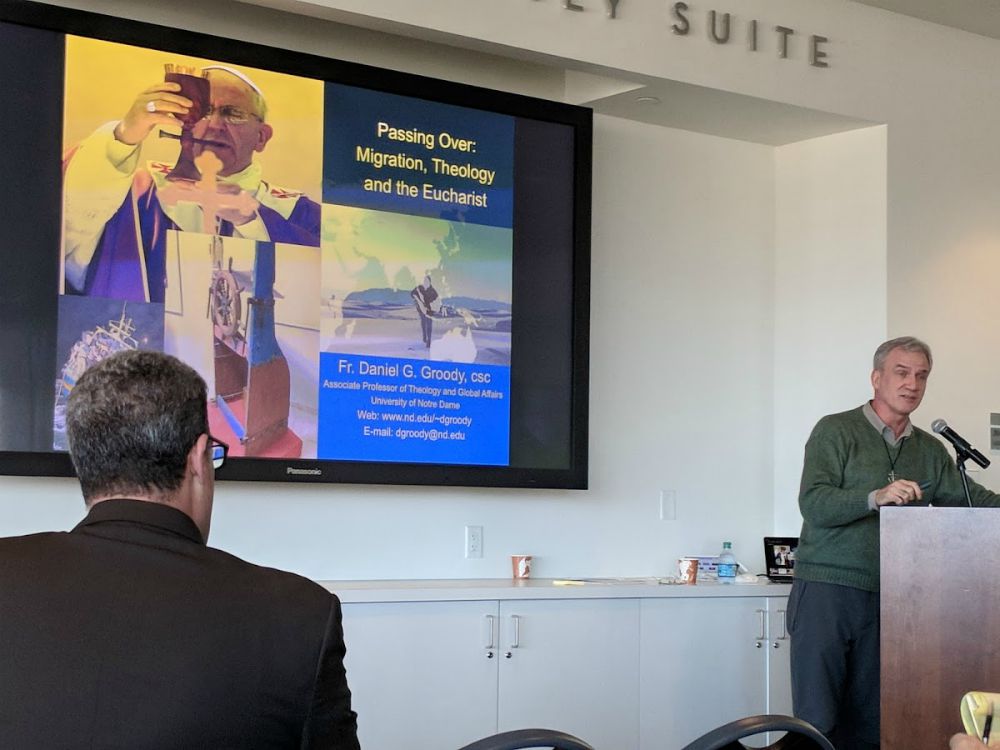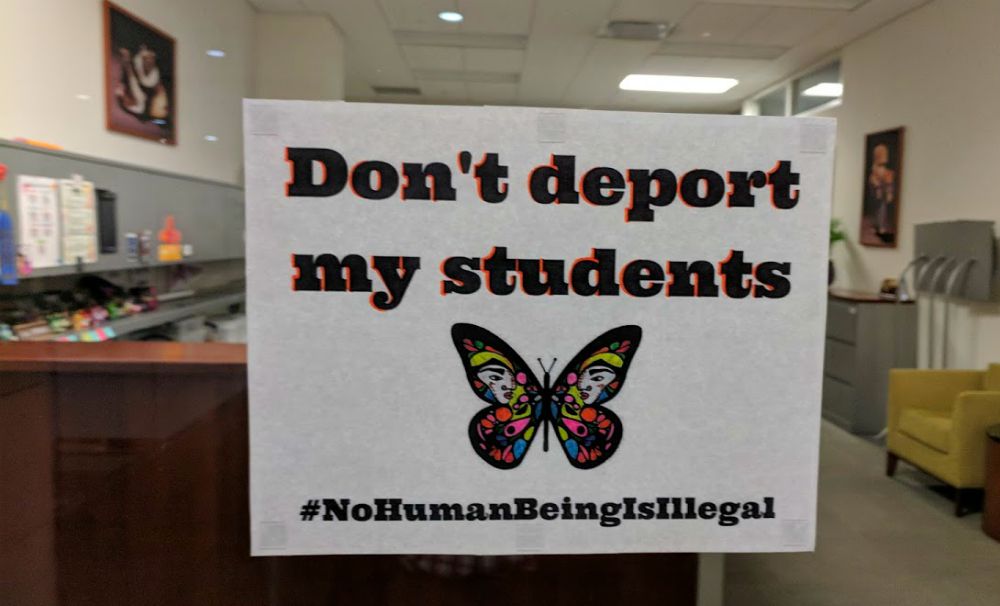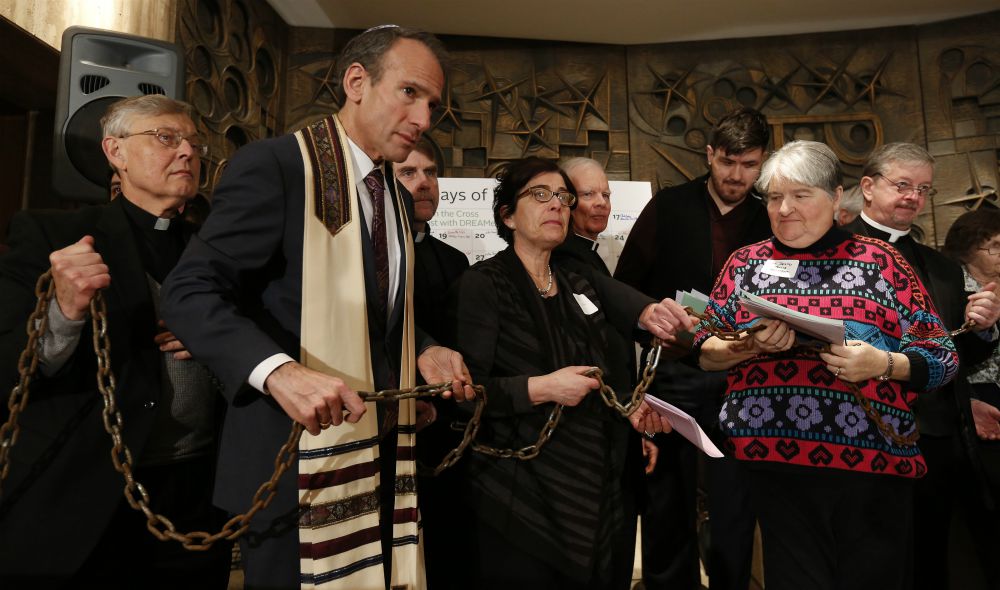
Holy Cross Fr. Daniel Groody, associate professor of theology and global affairs at the University of Notre Dame, speaks at "The World on the Move: Migration and Immigration in Uncertain Times" symposium The Jan. 25 sponsored by the CSJ Center for Reconciliation and Justice and Loyola Marymount University. (Peter Tran)
A number of participants and presenters at a recent symposium on migration say that in order to move forward in solving migration issues, they must first and foremost understand the migrants' stories of struggles and challenges — and take action to help our "migrant brothers and sisters."
At the symposium, "The World on the Move: Migration and Immigration in Uncertain Times," there were also voices of anger, frustration and defiance toward the migration policy under the current U.S. administration that some called a "racist" policy. The Jan. 23-25 symposium, sponsored by the CSJ Center for Reconciliation and Justice and Loyola Marymount University, came on the one-year anniversary of the three executive orders by President Donald Trump on border security, interior enforcement, and refugees.
Presenters such as Catholic Relief Service's senior advisor for Africa, migration attorneys and scholars, and university professors, and faculty and staff who are immigrants themselves, spoke about immigrants' contributions, the capping of the refugee quota, and the fear that the migrant community has over the increased deportation enforcement.
Advertisement
Attorneys recommended that migrants and undocumented students seek appropriate counsel as they do have legal due process. A panel of professors from University of California-Los Angeles, University of California, Loyola Marymount, and National Immigration Law Center spoke about how to protect students who are recipients of Deferred Action for Childhood Arrivals status (DACA) from Immigration and Customs Enforcement officials coming on campus to deport undocumented students.
Edward Park, professor of Asian Pacific American Studies at Loyola Marymount, said in the opening of the DACA session that there are more than 800,000 registered in the DACA program. "We are standing at the verge of a massive deportation," he said.
In a session titled "Close to Home: Stories from Faculty and Staff," Loyola Marymount theologian Cecelia Gonzalez-Andrieu challenged the other faculty to protect their students.
"Are we ready to go to jail? I am ready to go to prison to protect my students," she said.
Other faculty members agreed, with Arnab Banerji, communications professor at Loyola echoing that passion.
"We must encourage leaders at LMU for their courage to help undocumented students. We must stand up to racism," said Banerji, who received his bachelor's and master's in English literature at Jadavput University in India. "We need to fight fascism and white supremacy."
At the refugee crisis management session, the participants were split into small groups. A few groups said there is a "lack of empathy" for migrants and refugees, citing that their stories are not well-known. Most people only have a myopic view of migrants who are coming to "steal jobs, [are] breaking the law or being criminals or rapists," said one group. Another group said the Catholic Church needs to use the pope's message on welcoming refugees and migrants, teach it in religious education, and preach on the subject on the pulpit.
Continuing on the theme of moving forward amid uncertain times, participants and presenters agreed on a strategy of narrating the human stories of migrants and refugees.
Rachel Wen-Paloutzian, a Loyola staff librarian, said it is imperative to "put a human face" on DACA recipients and undocumented migrants. It helps to learn about their "struggles and stories," said Wen-Paloutzian, originally from Guangdong, China.
Alexandra Avendano, 22, from Mexico, received a temporary visa for victims of human trafficking to remain and work in the United States. She said life is unpredictable and things that people thought that would not happen can happen to them. When she and her older sister tried to escape from captivity in 2009, her sister was killed.
"I learned from my own story that you need to be a human being, to be kind, sympathetic, compassionate to those who suffering," Avendano said. "We need to look after one another. I know what it is like to be children and separated from their parents. We need to walk in their shoes."

A poster at the library at Loyola Marymount University (Peter Tran)
"Nobody knows, as the future is uncertain," said St. Joseph Sr. Louise Micek, assistant at the Justice Center for the Sisters of St. Joseph. "We need to keep hope. We need to have sympathy for those who lose hope, for they don't know what is going to happen to them."
Holy Cross Fr. Daniel Groody, associate professor of theology and global affairs at the University of Notre Dame, proposed a way to reframe the thinking on migration from a theological perspective through the Eucharist. During a presentation, he showed a photo of Syrian women gathering together with their children. One of the women just found out her husband had died.
"We saw the face, but we don't know the story," Groody said. "Unless we enter into that space and understand the suffering she endured from losing her husband, then we are not ready to see what God has revealed. This is where we can see the humanity in the raw form. The Eucharist is where we can move from the otherness to oneness. It is our identity. If we don't see our neighbors as the image of God, then we become aliens ourselves."
In the local church, there are leaders who also encouraged people in the parish to stand up for migrants and refugees. Speaking with NCR from Las Cruces, New Mexico, retired Bishop Ricardo Ramirez of Las Cruces, New Mexico, said that people are divided into thirds on the issue of migrants and refugees: one third pro-migrants, one third against and one third that are undecided.
"At the local level, the church's role of education for justice, peace and justice for immigrants is essential," said Ramirez, who even in retirement remains an active force in advocating for social justice causes and speaking out on polarizing issues like immigration in the Trump administration.
"We may have people who disagree with us, but we should concentrate on educating the people about our suffering brothers and sisters," he said.

Fr. Greg Sakowicz, rector of Holy Name Cathedra in Chicago, Rabbi Paul F. Cohen of Temple Jeremiah, and others hold a chain in solidarity during a Feb. 12 news conference announcing a Lenten fast by priests and religious brothers and sisters to show support for those with Deferred Action for Childhood Arrivals status, known as "Dreamers." (CNS/Chicago Catholic/Karen Callaway)
He said there are people who inaccurately criticize bishops about their position on the borders and that the bishops recognize the right of the sovereign to control and protect its borders. He cited the pastoral letter, Strangers No longer: Together on the Journey of Hope, where the bishops wrote that they accept the legitimacy of the U.S. government "in intercepting undocumented migrants who attempt to travel through or cross" into the country. However, they made clear that they do not accept some of "the policies and tactics" that the government has employed to meet this responsibility.
"We should treat our migrant brothers and sisters with dignity," he added, reiterating the position of the bishops' conference that "in any enforcement action, the human rights and dignity of the person should be preserved and respected to the greatest extent possible. U.S. immigration policy should prioritize family reunification and protect vulnerable populations."
Redemptorist Fr. Ricardo Elford, who has been working with migrants — documented and undocumented for 50 years in Tucson, Arizona — told NCR as a church "we need to continue to stand up" for these people.
"We need to learn about these migrants' lives and teach others around us the real stories of these migrants," he said. "We need to go back to the Gospel and live Christ's message about caring for those who are suffering."
The priest said many migrants are fearful and anxious that ICE will pick them up and deport them. "This is terrible, but it is never too late to take action in helping our migrant brothers and sisters," he said, suggesting that apart from the Sunday homily, parishes should organize a monthly social justice evening where speakers can be invited in to talk about immigration.
[Peter Tran is a former editor of the Union of Catholic Asian News at the main editorial office in Bangkok. He was involved for some 20 years with refugee ministry in the United States and at the Vatican. He is now assistant director of the Redemptorist Renewal Center in Tucson, Arizona.]








